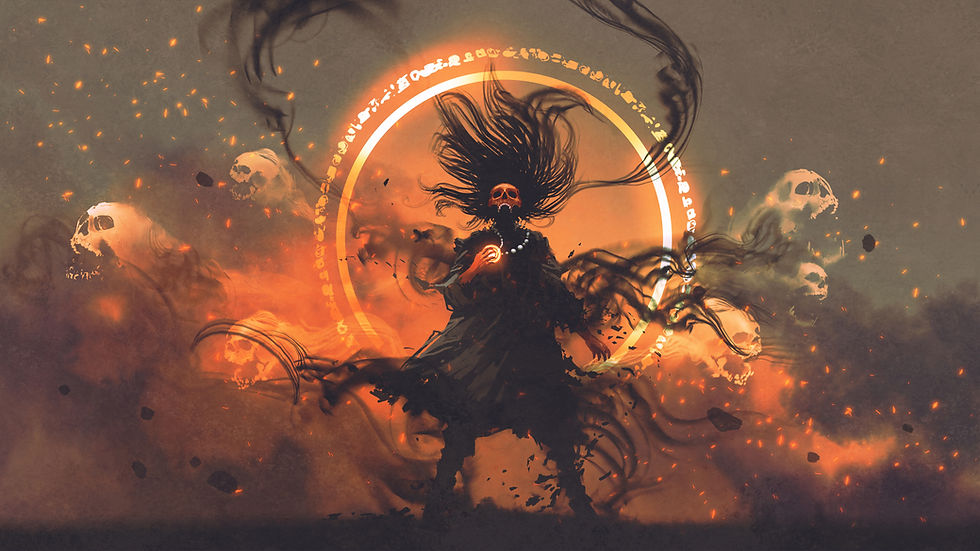May the Odds be Ever in The Hunger Games’ Favor
- Lily Mortensen
- Nov 8, 2024
- 4 min read
by Lily
Recently, with increased uncertainty over the future of many governments, especially in the United States this past week, it might seem like we are moving closer and closer to a dystopian society every day. Because of this, dystopian books are becoming more plausible every day. One such example is The Hunger Games by Suzanne Collins, a still-growing franchise that might be the most relevant of all. But what really goes into making a powerful dystopian novel?
One of the defining characteristics of the dystopian genre is that (through dramatized worst-case scenarios) they criticize current trends, societal norms, or political systems. The criticism of many aspects of society offered by The Hunger Games is particularly complex and has only grown more relevant as time goes on. One major feature of the society in these books is that the wealthy citizens of the Capitol wait to watch poor citizens of the districts starve, turn on each other, and die brutal deaths in an arena similar to how we watch reality TV shows.
They have been desensitized to suffering and brainwashed to think that people from the districts are so lowly that their deaths mean nothing. Currently, this mirrors how in modern times, we are so exposed to human suffering in the Middle East, Ukraine, and many areas in Africa. One especially poignant example is the way Westerners have been manipulated by heavy propaganda and media bias regarding the ongoing Palestinian genocide. Overwhelmed by calls to donate, protesters deemed anti-semitic, and graphic videos on social media, many American citizens, like citizens of the Capitol, can brush these things off and go about their daily lives. When reading The Hunger Games, an observant reader is forced to confront their negligence and (if they understood the message of the book) will walk away with a heightened awareness of media bias and we talk about the suffering of minorities.
Another important characteristic of effective books is having complex and compelling characters. In The Hunger Games, the protagonist Katniss Everdeen is faced with the burden of keeping her little sister Primrose alive from a very young age after the death of their father. At the time of the book, she takes this on in a much more obvious way by volunteering to enter the games in Prim’s place. She speaks out against the Capitol in the safety of the woods with her best friend Gale, and she unknowingly walks into becoming the face of a revolution. Throughout the story, she struggles to grapple with the emotional burdens of her situation and grows to see herself as an anti-hero. Her character arc and strong-willed personality are features normally seen in male protagonists, whereas Peeta (the male lead) presents a more stereotypically ‘feminine’ character bringing an emotional perspective that contrasts Katniss’ bluntness. She is aware of her two male love interests, Peeta and Gale, but her priority always lies in protecting her family. This subversion of expectations builds up their characterizations and leads the reader to look deeper at their motivations.
Despite the strengths of the books, the films are significantly less successful in conveying the core messages, most likely because it would have been impossible to turn a book that critiques media consumption into a highly profitable blockbuster film without the entire story becoming deeply ironic. When analyzed, anyone could see how the movie mirrors their society, presenting watchers with the flaws in their government, however, the average consumer will not look much deeper than the surface level. In the films, the feminist portrayal of Katniss’ character in the book is also twisted, and sexualized to be more appealing to movie audiences. There is something to be said in this argument about how the book itself weaves irony into the turns Katniss’ life takes; At the beginning of the first book, she very adamantly did not want to become a spectacle at the hands of the Capitol. Despite this by the end of the trilogy she has become an almost mythologized figure of the revolution, the Mockingjay is a melodramatic caricature of Katniss. The use of this irony/hypocrisy becomes a powerful tool in the storytelling.
A good dystopia uses many elements to create a powerful and relevant reflection of real-world problems. When a book (with the use of compelling characters and plotlines) can make this critique relevant to readers across many different backgrounds and ages, and even retain this relevancy for many years, that is the mark of a good dystopian novel. No one does these things better than Suzanne Collins in her trilogy The Hunger Games.
Works Cited
Dominguez, Laura Pereira. "Virginity, Wilderness, and Bows: Diana's Return in Contemporary Cinema." Journal of Comparative Literature and Aesthetics, vol. 43, no. 4, winter 2020, pp. 28+. Gale Academic OneFile, link.gale.com/apps/doc/A643395604/GPS?u=nysl_sc_campsav&sid=bookmark-GPS&xid=492ec8ec, Accessed 15 Oct. 2024.
“Dystopias: Definitions and Characteristics.” ReadWriteThink, International Literacy Association/ National Councils of Teachers of English, http://www.readwritethink.org/files/resources/lesson_images/lesson926/DefinitionCharacteristics.pdf
Nyman, Rena. “The Hunger Games as Dystopian Fiction.” Northeastern University, 2015,
https://openjournals.neu.edu/nuwriting/home/article/view/127/114. Accessed 15 Oct,
2024.
Tompkins, Joe. "The Makings of a Contradictory Franchise: Revolutionary Melodrama and
Cynicism in The Hunger Games." JCMS: Journal of Cinema and Media Studies, vol. 58,
no. 1, fall 2018, pp. 70+. Gale Academic OneFile, link.gale.com/apps/doc/A598464375/GPS?u=nysl_sc_campsav&sid=bookmark-GPS&xid=afdda1cf. Accessed 15 Oct. 2024.





Comments